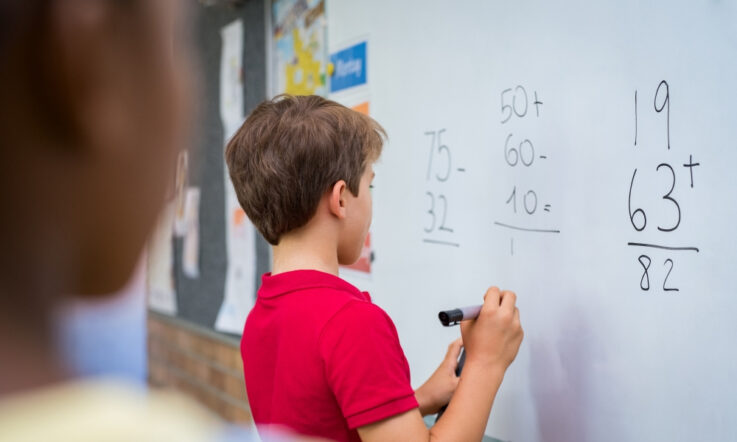This podcast from Teacher magazine is supported by Bank First. Bank First is a customer owned bank, committed to supporting the education community. They've been financially empowering educators to realise their dreams since 1972, and understand that your passion, dedication and expertise make a real difference to people's lives. Visit bankfirst.com.au to find out how they can help you reach your financial goals.
Thanks for downloading this episode of Teacher Staffroom, where we catch you up on the latest evidence, insight, and action. I'm Dominique Russell.
Changing school practices means everyone working together – leaders, teachers, support staff, students, parents and the wider community – toward the goal of improving outcomes for students, including their levels of achievement and wellbeing. At Teacher, we've heard plenty of inspiring school improvement stories, and in today's episode I'm going to take you through some recent highlights.
Like all episodes of Teacher Staffroom, I'll take you through these topics, along with other noteworthy stories. I'll also be posing some questions throughout this podcast, so feel free to pause the audio as you go, gather some colleagues and discuss together how these stories could be relevant to your school context. Let's jump in.
The first story I'd like to highlight is a fantastic example of a school improvement process which has made a significant impact on student learning and staff wellbeing. I caught up with Elizabeth Humphries and Nicole Wilson, Principal and Assistant Principal at East Derwent Primary School in Tasmania, for a podcast episode in our School Improvement series. In just two years, they've gone from an environment where the focus of every day was safety and behaviour, to one where learning is at the centre and students are more engaged than ever.
A big part of this shift was the school's involvement in the Tasmanian Department of Education's Refocus Teaching and Learning initiative, which focuses on play and inquiry in the early years. Here's a snippet from Nicole in the episode where she talks about the steps their school took to complement the Refocus Teaching and Learning initiative.
And then also central to that is an understanding that we work with capable and competent learners. So we had to spend a lot of time building that vision and understanding that we are working with capable, competent learners regardless of our context and despite a lot of, yeah, disadvantage in this area, they are capable competent learners. We plan, teach and assess with intentionality and all of this is done through collaborative learning communities of research, action and reflection. So all of those things just tied in so well with what we wanted, our vision for our school at that point.
Nicole also spoke about how the shift in school culture has meant teachers are able to make learning more targeted, and that brings me to something to think about. As a teacher, how are you listening and responding to the interests and needs of your students? Is there room to make learning more targeted in your classroom?
An important part of many school improvement journeys is staff professional development. We heard from Laureate Professor Jenny Gore from the University of Newcastle's Teachers and Teaching Research Centre. She, along with her colleagues Associate Professor Jess Harris and Senior Lecturer Drew Miller, discussed the impact of Quality Teaching Rounds on student outcomes.
Quality Teaching Rounds is a form of professional development which aims to have educators enrich student learning through collaborative, teacher-driven analysis and refinement of practice. It's a form of PD that's relevant to all subject areas. I found this comment from the authors on professional develop which isn't subject-specific particularly interesting. They had this to say:
Demonstrating the link between PD and improved student achievement is not easy. In the few cases where this link has been found, the PD has focused on a single subject area or specific teaching strategy. It is even more difficult to find links between student outcomes and PD focused on improving pedagogy across all subjects and grades. Yet, finding effective ways to improve teaching practice more broadly is crucial to empowering teachers to enrich the learning of all students.
Now, I'd like to take you to a highlight article for me on a professional learning resource which has been established to ensure the educational success of Aboriginal and Torres Strait Islander students in our schools. The resource is a website called yourstoryourjourney, and the team who developed it shared its features with Teacher. Here is how the team explains how the resource can be used in a school community:
The materials have been created by and with Aboriginal and Torres Strait Islander educators, scholars and researchers. Once you have found out more about what you know and don't know, you are provided with examples of resources and strategies to trial and learn about. Of course, there will always be some trial and error as you learn, practice, reflect and learn again. This can be challenging work. You are encouraged at every step to do deep learning.
Throughout the article various elements of the resource are discussed, and the team share some questions you'll be encouraged to have a think about. I'd like to take you to just a few of the questions posed in the article for you to consider in the context of your own school.
How can your school (or learning environment) acknowledge the Country you're on, and respect ‘on Country' stories? How do local Aboriginal and Torres Strait Islander people identify themselves and relate to others, and how does the school respect this? And, how can you work together to develop local Aboriginal and/or Torres Strait Islander curriculum?
Changing tune now to focus on a new suite of resources for mathematics from the Victorian Department of Education and Training. It aims to support principals, learning leaders and teachers in thinking about their priorities and student needs in mathematics and covers a range of topics like mathematics anxiety, critical connections between mathematics and numeracy, and engaging families in mathematics education.
ACER Senior Research Fellow Sarah Buckley outlined the monograph she wrote for an article in Teacher, which looks at the symptoms, causes and companions of mathematics anxiety. It also looks at strategies to identify it in students and teachers, and its impact on teaching and learning. I found this point she made on addressing maths anxiety of particular interest. She had this to say:
The monograph also emphasises cultural and conceptual challenges associated with addressing mathematics anxiety – for instance, the pervasive negative culture and societal attitudes surrounding mathematics in the community. A pedagogical challenge for teachers seeking to reduce mathematics anxiety in the classroom can be understanding that sometimes successfully addressing mathematics anxiety does not require mathematics teaching or trying to make maths fun.
So, I'd like to pose a few questions to think about on this topic. As a teacher, what has been your own experience with mathematics anxiety? Have you experienced it yourself? Have you noticed it in colleagues or your students? And, think about your class, or a group of students you teach. Do you know how they feel about mathematics? Have you ever discussed this with them?
Changing courses completely from maths to music now, and I'd love to share with you the stories of music teachers who are being recognised for their outstanding contribution to student learning. The nominees for this year's Telstra ARIA Music Teacher Award are Sarah Donnelley from Wilcannia Central School in New South Wales; Dr Thomas Fienberg from Evans High School in Sydney; Kathryn McLennan from Virginia State School in Brisbane; and CJ Shaw from Palmerston District Primary School in Canberra.
Sarah is all about using music as a vehicle for forming stronger connections with students, family and the school. Thomas is passionate about giving Aboriginal and Torres Strait Islander students the space to explore their cultural identity in his classroom and uses an artist in residence program to showcase Indigenous talent. Kathryn is committed to developing the performance skills of students, mentoring beginner teachers and incorporating Auslan into her teaching. And CJ uses music as a cross-curricular tool. He had this today about his priorities:
Teaching subjects through music and verse can have immediate impacts. The use of lyrics, melody and rhymes help students connect to their lessons especially if there is a learning barrier or if English is a second language.
So, that point just there brings me to something to think about. As a music teacher, how are you using music to support student learning across the entire curriculum? How often do you collaborate with teachers from other subject areas?
And finally for this episode, I'd like to take you to another voice you might be familiar with who wrote on the topic of school improvement. Tanya Vaughan is a regular voice at Teacher, and she – along with Liam Stakelum from Marist College in Canberra and Susannah Shoeffel from Evidence for Learning – discussed evidence-based school improvement in a recent article.
Author Liam Stakelum had recently taken up the position of Head of Teaching and Learning at Marist College. He had a vision for change with the school and in this article he outlines how he planned for implementation, how he used the Victorian Department of Education's High Impact Teaching Strategies, and also their prioritisation of effective professional learning.
The implementation process at Marist College was adapted in response to data gathered from teachers. So, that brings me to something to a final point to think about. How often do you reflect on and review progress? Do you adapt your approach accordingly?
That's all for this episode, and you're now all caught up on the latest in evidence, insight and action in education. Links to all the content and resources I've mentioned will be in the transcript of this podcast, available at our website, teachermagazine.com.au.
You've been listening to a podcast from Teacher magazine supported by Bank First. Bank First is a customer owned bank, committed to supporting the education community. They've been financially empowering educators to realise their dreams since 1972, and understand that your passion, dedication and expertise make a real difference to people's lives. Visit bankfirst.com.au to find out how they can help you reach your financial goals.



